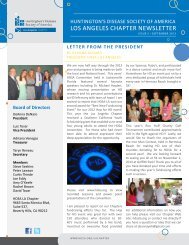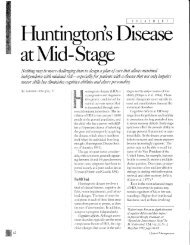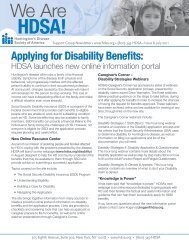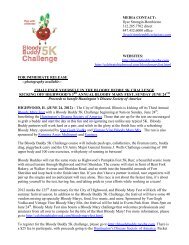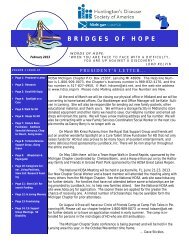Apathy and Unawareness in Huntington's Disease
Apathy and Unawareness in Huntington's Disease
Apathy and Unawareness in Huntington's Disease
You also want an ePaper? Increase the reach of your titles
YUMPU automatically turns print PDFs into web optimized ePapers that Google loves.
<strong>Apathy</strong> <strong>and</strong> <strong>Unawareness</strong> <strong>in</strong> Hunt<strong>in</strong>gton’s<br />
<strong>Disease</strong><br />
Presentation by Danielle Bl<strong>in</strong>koff, B.A.<br />
University of South Florida, Cl<strong>in</strong>ical Psychology Doctoral Program<br />
HDSA Center of Excellence at University of South Florida
The <strong>in</strong>formation provided by speakers <strong>in</strong><br />
workshops, forums, shar<strong>in</strong>g/network<strong>in</strong>g sessions<br />
<strong>and</strong> any other educational presentation made as<br />
part of the 2013 HDSA Convention program is<br />
for <strong>in</strong>formational use only.<br />
HDSA encourages all attendees to consult<br />
with their primary care provider, neurologist or<br />
other healthcare provider about any advice,<br />
exercise, medication, treatment, nutritional<br />
supplement or regimen that may have been<br />
mentioned as part of any presentation.
Presenter Disclosures<br />
Danielle Bl<strong>in</strong>koff<br />
The follow<strong>in</strong>g personal f<strong>in</strong>ancial relationships with<br />
commercial <strong>in</strong>terests relevant to this presentation<br />
existed dur<strong>in</strong>g the past 12 months:<br />
No relationships to disclose<br />
or list
Presentation Outl<strong>in</strong>e<br />
• <strong>Apathy</strong><br />
– What is apathy <strong>and</strong> why care?<br />
– Why does apathy occur <strong>in</strong> HD?<br />
– What are ways to cope with apathy?<br />
• <strong>Unawareness</strong><br />
– What is unawareness <strong>and</strong> why does it occur?<br />
– How can we deal with unawareness?<br />
– Special situations: Driv<strong>in</strong>g
Danielle Bl<strong>in</strong>koff<br />
• Cl<strong>in</strong>ical Psychology Ph.D. Student at the University<br />
of South Florida<br />
• Study<strong>in</strong>g Neuropsychology.<br />
• Research <strong>in</strong>terests are <strong>in</strong> dementia, executive<br />
functions<br />
• Currently cl<strong>in</strong>ical research coord<strong>in</strong>ator at the HDSA<br />
Center of Excellence at the University of South<br />
Florida.
What is <strong>Apathy</strong>?<br />
• <strong>Apathy</strong> comes from the Greek for “pathos” mean<strong>in</strong>g<br />
passion.<br />
• Prefix a- means without.<br />
• Current conceptualizations:<br />
– Emotional Impairment (Mar<strong>in</strong> 1990).<br />
– Indifference, flat affect (Stuss 2000).<br />
– Reduction <strong>in</strong> self-purposeful, self-generated<br />
behaviors (Levy & Dubois, 2006).<br />
– Difficulties with <strong>in</strong>itiation (Robert et al. 2008).
Prevalence<br />
• <strong>Apathy</strong> has been shown to<br />
affect up to 50% - 70% of<br />
patients with HD.<br />
• (Krishnamoorthy & Crauford, 2011; Paulsen,<br />
Ready, Hamilton, Mega & Cumm<strong>in</strong>gs, 2001).<br />
Image from : http://1.bp.blogspot.com/-1gThEe06FVg/UaNJIx-<br />
WtrI/AAAAAAAAFCk/2qZ622enQpg/s1600/dna.jpg
What is <strong>Apathy</strong>? 3 Dimensions<br />
• Motor <strong>Apathy</strong><br />
– Reduction of gestures<br />
– Walk<strong>in</strong>g <strong>in</strong>itiation difficulties<br />
• (Masterman & Cumm<strong>in</strong>gs, 1997)<br />
Image from:<br />
http://runners-h1gh.tumblr.com
What is <strong>Apathy</strong>? 3 Dimensions<br />
• Cognitive <strong>Apathy</strong><br />
– Reduced <strong>in</strong>terest<br />
• (Masterman & Cumm<strong>in</strong>gs, 1997)<br />
Image from: http://sharpbra<strong>in</strong>s.com/blog/2006/12/28/is-bra<strong>in</strong>fitness-scientifically-proven-to-improve-cognitive-skills/
What is <strong>Apathy</strong>? 3 Dimensions<br />
• Emotional <strong>Apathy</strong><br />
– Reduced emotional engagement<br />
– Flattened affect<br />
• (Masterman & Cumm<strong>in</strong>gs, 1997)<br />
Image from: http://sweetclipart.com/theater-masks-silhouette-908
Signs of <strong>Apathy</strong> <strong>in</strong> Hunt<strong>in</strong>gton’s <strong>Disease</strong><br />
• Un<strong>in</strong>terested <strong>in</strong> surround<strong>in</strong>gs.<br />
• Unmotivated<br />
• Loss of enthusiasm & spontaneity<br />
• Needs to be pushed to do work or chores<br />
• Stops <strong>in</strong>itiat<strong>in</strong>g activities with friends <strong>and</strong> family<br />
• Flat affect (show<strong>in</strong>g little emotion)<br />
• (Rosenblatt et al., 2009)
<strong>Apathy</strong> is not a reaction to symptoms!<br />
• Related to physiological changes <strong>in</strong> the bra<strong>in</strong><br />
– Not necessarily reaction or adaptation to disability<br />
(from PD literature) (Pluck & Brown 2002).<br />
http://www.b<strong>in</strong>g.com/images/search?q=bra<strong>in</strong>&qs=n&form=QBIR&pq=bra<strong>in</strong>&sc=8-5&sp=-<br />
1&sk=#view=detail&id=7B6FEEF375F42A3241E3A48BE52EA3B59F2BB66E&selectedIndex=0
<strong>Apathy</strong> <strong>and</strong> the Bra<strong>in</strong><br />
• HD is a basal<br />
ganglia disorder<br />
(the caudate<br />
nucleus is<br />
affected).<br />
• Problems <strong>in</strong> this<br />
part of the bra<strong>in</strong><br />
can affect other<br />
areas <strong>in</strong>clud<strong>in</strong>g<br />
areas that affect<br />
emotion.<br />
http://2011gtms8h.wikispaces.com/file/view/Basal_Ganglia.jpg/23<br />
4090606/166x196/Basal_Ganglia.jpg
http://www.healthplexus.net/files/images/2009/CGSreport/1208Chowfig1.jpg
Frontal Lobes<br />
• Dysexecutive Syndrome:<br />
– Responsible for apathy <strong>and</strong> unawareness (among<br />
other symptoms such as impulsivity).<br />
– Frontal lobes: higher order th<strong>in</strong>k<strong>in</strong>g, plann<strong>in</strong>g
What <strong>Apathy</strong> Is NOT<br />
http://www.clker.com/cliparts/d/E/J/y/P/v/do-not-pass-hi.png
<strong>Apathy</strong> is NOT Laz<strong>in</strong>ess<br />
Image from: www.socialsmil<strong>in</strong>g.com
<strong>Apathy</strong> is NOT Depression
<strong>Apathy</strong> Vs. Depression<br />
Depression<br />
Sad Mood<br />
Loss of Pleasure<br />
Worthlessness/Guilt<br />
Indecisiveness<br />
Suicidal Ideation<br />
Trouble Concentrat<strong>in</strong>g<br />
<strong>Apathy</strong><br />
Loss of Interest<br />
Not want<strong>in</strong>g to try new th<strong>in</strong>gs<br />
Lack<strong>in</strong>g Initiation<br />
-needs pushed to get chores done<br />
-others need to <strong>in</strong>itiate social gather<strong>in</strong>gs<br />
Flat affect<br />
Low spontaneity<br />
(DSM-IV-TR, 2000) (Levy et al. 1998)
<strong>Apathy</strong> is NOT Depression<br />
• Why is this important?<br />
• People with apathy without depression rarely report<br />
anhedonia, or no longer enjoy<strong>in</strong>g pleasure <strong>in</strong> th<strong>in</strong>gs<br />
(Krishnamoorthy & Crauford, 2011).<br />
• This means the patients still enjoy hobbies <strong>and</strong><br />
activities, they just may have some problems<br />
<strong>in</strong>itiat<strong>in</strong>g <strong>and</strong> susta<strong>in</strong><strong>in</strong>g those activities.
<strong>Apathy</strong>: Why Care About It?<br />
• May affect both patient <strong>and</strong> caregiver quality of life.<br />
• May dim<strong>in</strong>ish treatment compliance.<br />
• Patient may not be motivated to stay active (activity<br />
could help stave off decl<strong>in</strong>e).<br />
• Patients are unlikely to compla<strong>in</strong> of apathy<br />
– (Oguru, Tachibana, Toda, Okuda, & Oka, 2010).<br />
• http://www.healthplexus.net/article/apathy-dementia-significant-behavioural-challenge
Treat<strong>in</strong>g <strong>Apathy</strong> : Do Someth<strong>in</strong>g Fun!<br />
• Set up pleasant activities for the person with apathy<br />
to engage <strong>in</strong>.<br />
• This should be activities the person chooses/likes,<br />
not what the caregiver feels the person SHOULD be<br />
do<strong>in</strong>g.<br />
• Have a companion engage <strong>in</strong> the activity with the<br />
person.<br />
– Helps with attention.
Treat<strong>in</strong>g <strong>Apathy</strong> : Plan It!<br />
• Ma<strong>in</strong>ta<strong>in</strong> a Regular Schedule/ Rout<strong>in</strong>e
Treat<strong>in</strong>g <strong>Apathy</strong> : Set Up Activities!<br />
• Increase Environmental Stimulation (not too much<br />
though!)<br />
http://onwardstate.com/2012/11/30/pennstate-needs-a-f<strong>in</strong>als-week-puppy-room/
Treat<strong>in</strong>g <strong>Apathy</strong>: Get Involved!<br />
• Day Programs
Treat<strong>in</strong>g <strong>Apathy</strong> : Provide Choices<br />
Limit Open-ended Questions: Yes or No is the way to go!
Treat<strong>in</strong>g <strong>Apathy</strong> : Cue<strong>in</strong>g!<br />
• Provide external cues <strong>and</strong> prompts<br />
• Example: PD patients <strong>and</strong> walk<strong>in</strong>g over a l<strong>in</strong>e helps<br />
them <strong>in</strong>itiate movement.<br />
• Initiat<strong>in</strong>g or suggest<strong>in</strong>g an activity may be all that is<br />
needed.
Remember…<br />
• Initiation is the big issue when it comes to apathy!<br />
http://elimasterlocksmith.com/services/emergency-locksmith/car-ignition
Caregivers:<br />
• As the caregiver, it’s your job to press the start<br />
button!
BUT!<br />
https://apps.education.ucsb.edu/wiki/File:Warn<strong>in</strong>g.svg
No Forc<strong>in</strong>g!<br />
• Don’t push too hard. Could result <strong>in</strong> irritability or<br />
outburst.<br />
• It’s ok if they want to sit around sometimes.<br />
• “No” is OK!<br />
http://bodybalance4you.wordpress.com/2013/01/29/push-<strong>and</strong>-pull/
http://www.trishblackwell.com/the-balance-game/
What is <strong>Unawareness</strong>?<br />
• “Anosognosia”<br />
– Means denial of weakness<br />
– Associated with apathy <strong>and</strong> frontal lobe<br />
dysfunction (Starkste<strong>in</strong> et al., 2010; Cutt<strong>in</strong>g,<br />
1978).<br />
• Both apathy <strong>and</strong> <strong>in</strong>sight is associated with right<br />
hemisphere function (Ott et al., 1996).<br />
• Social apathy is described as a lack of action<br />
<strong>in</strong> one’s own self-<strong>in</strong>terest (Stuss, 2000).
What is <strong>in</strong>sight?<br />
• People with <strong>in</strong>sight<br />
– Underst<strong>and</strong> their limitations<br />
– Motivated to engage <strong>in</strong> activities that match their<br />
current functional status (Starkste<strong>in</strong>, Brockman,<br />
Bruce & Petracca, 2010).
Denial<br />
• Can occur because of difficulty deal<strong>in</strong>g with a bad<br />
circumstance.<br />
– Decreases over time<br />
• Organic denial: unawareness of own disability<br />
– This may never decrease
Why does <strong>Unawareness</strong> Occur?<br />
• Protective for person<br />
– Example: In Alzheimer’s disease, <strong>in</strong>sight is<br />
associated with anxiety (Verhey, Rozendaal,<br />
Pondes, & Jolles, 1993).<br />
• Executive Dysfunction<br />
• Response to an overwhelm<strong>in</strong>g situation.
Cop<strong>in</strong>g with <strong>Unawareness</strong><br />
Acceptance
Cop<strong>in</strong>g with <strong>Unawareness</strong>: Acceptance<br />
Don’t have a power struggle!
Rule of Thumb for Caregivers: Acceptance<br />
• Know when to back off.<br />
• If poor judgment is not hurt<strong>in</strong>g anyone, consider<br />
allow<strong>in</strong>g person to do what he or she wants.<br />
• Person may even realize your po<strong>in</strong>t of view<br />
eventually!
Cop<strong>in</strong>g with <strong>Unawareness</strong>: Acknowledge<br />
Noncompliance ≠ Intention
Cop<strong>in</strong>g with <strong>Unawareness</strong>: Acknowledge<br />
• Develop a contract<br />
– Include <strong>in</strong>centives for compliance<br />
– Rewards could be foods, activities, but make sure it’s<br />
someth<strong>in</strong>g the person likes, not what the caregiver<br />
chooses.<br />
– Formal agreement – expla<strong>in</strong>s expectations<br />
• Make realistic goals<br />
• Avoid requir<strong>in</strong>g acceptance or awareness
Cop<strong>in</strong>g with <strong>Unawareness</strong>: No Label<strong>in</strong>g<br />
• Avoid the HD label<br />
– Person may be able to talk about issues, but just does<br />
not acknowledge he or she has HD.<br />
• Though counsel<strong>in</strong>g may help, it may also have little<br />
impact on <strong>in</strong>sight.<br />
(Underst<strong>and</strong><strong>in</strong>g Behaviors <strong>in</strong> HD Book)
One of the most concern<strong>in</strong>g consequences of unawareness<br />
http://jetdealz.com/jetdealz-auto/
<strong>Unawareness</strong> & Driv<strong>in</strong>g<br />
• Can be a tricky topic.<br />
• Driv<strong>in</strong>g signifies <strong>in</strong>dependence for lots of<br />
people.<br />
• Most people do not want to give up driv<strong>in</strong>g.<br />
• Giv<strong>in</strong>g up driv<strong>in</strong>g can be considered a big<br />
loss for.<br />
some.<br />
– Transition slowly if possible<br />
• Only driv<strong>in</strong>g around the<br />
neighborhood<br />
• Avoid<strong>in</strong>g highways<br />
• Not driv<strong>in</strong>g at night<br />
http://www.helpguide.org/elder/senior_citizen_driv<strong>in</strong>g.htm
Ways to Talk about Driv<strong>in</strong>g<br />
• Respect<br />
• Give Examples of Performance<br />
• Numbers (more people provid<strong>in</strong>g <strong>in</strong>fo)<br />
• Help F<strong>in</strong>d Alternatives<br />
– Shuttles<br />
– Carpool<strong>in</strong>g<br />
– Public Transportation
What if talk<strong>in</strong>g does not work?<br />
• Driv<strong>in</strong>g evaluation with an occupational therapist or<br />
certified drier rehabilitation specialist.<br />
– Gives a neutral, 3 rd party perspective. Makes it<br />
less accusatory.<br />
• If you are concerned with unsafe driv<strong>in</strong>g <strong>and</strong> all<br />
other suggestions do not work, you may make an<br />
anonymous report to your state’s Department of<br />
Motor Vehicles.
Summary<br />
• Both apathy <strong>and</strong> unawareness occur because of changes <strong>in</strong><br />
the bra<strong>in</strong> due to HD.<br />
• These symptoms are not the person’s fault.<br />
• <strong>Apathy</strong> can be improved with provid<strong>in</strong>g a regular schedule<br />
<strong>and</strong> the caregiver <strong>in</strong>itiat<strong>in</strong>g pleasant activities.<br />
• It is important remember that some people may never<br />
become aware of their disabilities. Creat<strong>in</strong>g a contract could<br />
help.<br />
• Never push too hard when deal<strong>in</strong>g with apathy or<br />
unawareness!<br />
• Caregivers may <strong>in</strong>tervene if unawareness is putt<strong>in</strong>g the<br />
patient <strong>in</strong> a dangerous situation.
Resources<br />
• Driv<strong>in</strong>g Information:<br />
– http://www.helpguide.org/elder/senior_citizen_driv<strong>in</strong>g.htm<br />
• General Information about HD:<br />
– http://stanford.edu/group/hopes/cgi-b<strong>in</strong>/wordpress/<br />
– http://hdscotl<strong>and</strong>.org/images/stories/InformationResources/physicians_g<br />
uide.pdf<br />
– http://www.hdsa.org/liv<strong>in</strong>g-with-hunt<strong>in</strong>gtons/publications/<strong>in</strong>dex.html<br />
• Nance, Paulsen, Rosenblatt, & Wheelock (2011). A Physician’s Guide to the<br />
Management of Hunt<strong>in</strong>gton’s <strong>Disease</strong>. HDSA. USA.<br />
• Paulsen (1999). Underst<strong>and</strong><strong>in</strong>g Behavior <strong>in</strong> Hunt<strong>in</strong>gton’s <strong>Disease</strong>. HDSA.<br />
• Pollard, Best, Imbigilo, Klasner, Rub<strong>in</strong>, S<strong>and</strong>ers, & Simpson (1999). A<br />
Caregiver’s H<strong>and</strong>book for Advanced-Stage Hunt<strong>in</strong>gton’s <strong>Disease</strong>. HDSA.
Questions?



